Project cargo in the Philippines refers to the transportation of large and complex shipments that require specialized handling and expertise. With the country’s growing economy and booming infrastructure projects, project cargo handling service companies in the Philippines, like Full Speed Chartering and Shipping Agency, Inc., play a crucial role in ensuring the timely delivery of materials and equipment needed for these ventures. Understanding the intricacies of maritime shipping in relation to project cargo is essential for businesses and individuals involved in this industry.
This article aims to provide an overview of project cargo in the Philippines, focusing on how maritime shipping facilitates the movement of these extraordinary loads while also exploring the challenges and opportunities that arise along the way.
Click here to find out about our project cargo handling services in the Philippines.
What is Project Cargo, and How is it Transported?
Project cargo refers to the transportation of large, heavy, or complex items that cannot be accommodated by standard shipping methods. These items often include machinery, equipment, and other oversized goods. The transport of project cargo requires specialized knowledge and expertise due to the unique challenges involved in handling such shipments.
In the Philippines, project cargo plays a crucial role in various industries, such as construction, oil and gas, power generation, and infrastructure development. Transporting project cargo in this archipelagic nation can be particularly challenging due to its geographical characteristics. The need for efficient logistics solutions arises from navigating through multiple islands with varying infrastructural capabilities.
To transport project cargo in the Philippines effectively, several modes of transportation are often utilized. Depending on the specific requirements of the shipment and the available infrastructure, options may include road transport using specialized trailers or low loaders for shorter distances or barge transportation for inter-island movements.
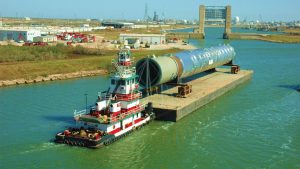
The Importance of Project Cargo Shipping
Project cargo in the Philippines plays a crucial role in the development and success of various industries in Luzon, Visayas, and Mindanao. With its archipelagic geography, the country heavily relies on maritime transport to connect different regions and facilitate trade. However, when it comes to handling oversized or heavy cargo for large-scale projects like construction, oil and gas exploration, or infrastructure development, specialized project cargo shipping becomes essential.
One key reason for the importance of project cargo shipping is its ability to handle unique logistical challenges. Unlike regular containerized shipments, project cargoes in the Philippines often require special equipment such as cranes, flat racks, or open-top containers. Moreover, they may need careful planning and coordination due to their exceptional weight or dimensions. Project cargo shipping companies in the Philippines have expertise in managing complex logistics involving multiple transportation modes such as sea freight, road haulage, or even air transportation if necessary.

Overview of the Philippine Maritime Shipping Industry
The Philippine maritime shipping industry plays a vital role in the country’s economy, offering an extensive network of ports and shipping routes that connect it to the global market. With over 7,000 islands scattered across its archipelago, the Philippines heavily relies on maritime transportation for both domestic and international trade. The industry encompasses various sectors, including containerized cargo, bulk cargo, passenger vessels, and specialized services such as project cargo.
Project cargo in the Philippines refers to the transportation of oversized or heavy equipment used for infrastructure development projects. With the government’s ambitious infrastructure program aimed at improving the country’s infrastructure, demand for project cargo services has been on the rise. This includes transporting construction machinery, industrial equipment, turbines, transformers, and other components required for large-scale projects like highways, power plants, bridges, and airports.
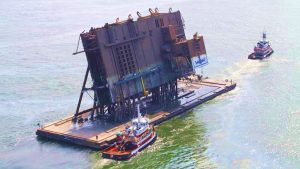
Understanding Project Cargo in the Philippines
As one of the fastest-growing economies in Southeast Asia, the Philippines has seen a significant increase in infrastructure projects, making project cargo shipping an essential component of its booming industry. To ensure the seamless movement of these specialized goods, both local and international logistics companies have developed expertise in handling project cargo in the Philippines.
The success of project cargo shipping hinges on meticulous planning and coordination among various stakeholders involved. From obtaining necessary permits to designing customized transportation solutions, every step requires careful attention to detail. Moreover, due to their weight and size, project cargoes often require specialized equipment such as cranes or trailers for loading and unloading.
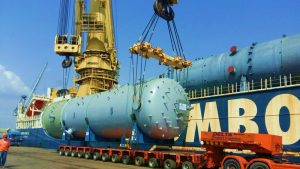
Types of Vessels Used in Project Cargo in the Philippines
Project cargo refers to the transportation of oversized, heavy, or complex goods that require special handling and expertise. In the Philippines, project cargo plays a crucial role in various industries, such as construction, energy, and infrastructure development. To efficiently transport these unique cargoes, different types of vessels are utilized.
One commonly used vessel for project cargo in the Philippines is the deck barge. A deck barge is a flat-bottomed vessel specifically designed to transport heavy and oversized cargo. It provides a large open deck space, allowing for easy loading and unloading of project cargoes.
Deck barges in the Philippines are typically equipped with strong, durable decks that can withstand heavy loads and provide stability during transportation. They are often used for transporting goods such as construction equipment, machinery, and modules for infrastructure projects.
Another type of vessel used for project cargo is the Landing Craft Transport (LCTs). LCTs are specifically designed to transport goods from shore to shore, making them ideal for delivering project cargo directly to remote or undeveloped areas.
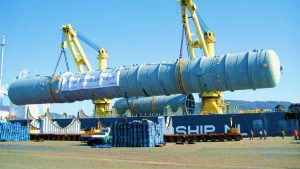
Unlike deck barges, LCTs have a bow ramp that can be lowered onto the beach or shallow water, allowing vehicles and equipment to be driven on and off the vessel easily. In the Philippines, LCTs play a crucial role in supporting various infrastructure projects across the archipelago.
Moreover, ro-ro (roll-on/roll-off) is another vessel commonly used for project cargo transportation. Ro-ro vessels are designed with ramps that allow vehicles and heavy machinery to be driven onto the ship, making them ideal for transporting oversized or wheeled project cargoes.
The ro-ro concept originated in the 19th century when railcars were loaded onto ships using tracks and ramps. Over time, this method evolved to accommodate trucks, trailers, and other wheeled equipment.
Furthermore, a heavy lift ship is another type of vessel used for project cargo transportation. These vessels are specifically designed to carry extremely heavy and oversized cargo that cannot be transported using traditional methods.
Heavy-lift ships have large open deck spaces and strong cranes or lifting equipment, allowing them to handle heavy loads. They can transport items such as large construction machinery, oil rigs, power plant components, and even entire buildings.
These ships are specifically designed to carry extremely heavy loads and have robust cranes capable of lifting hundreds of metric tons. Heavy lift ships offer flexibility in terms of loading and unloading procedures, making them ideal for transporting large machinery or equipment required for infrastructure projects.
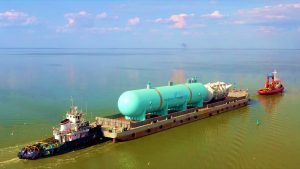
Challenges and Solutions in Project Cargo Shipping
Project cargo shipping in the Philippines faces numerous challenges, ranging from logistical constraints to regulatory hurdles. One of the major issues is the lack of adequate infrastructure and facilities for handling oversized and heavy cargo. The country’s ports often lack specialized equipment and storage areas, leading to delays and increased costs for project cargo shipments. In addition, poor road conditions further impede the transportation of these goods from ports to project sites.
Another challenge is navigating through complex customs procedures and regulations. Obtaining necessary permits and clearances can be time-consuming and cumbersome, resulting in potential delays at every stage of the shipping process. This can significantly impact project timelines, causing disruptions and financial losses for all stakeholders involved.
To overcome these challenges, various solutions are being explored by industry players in the Philippines. One solution that has been implemented is the establishment of dedicated project cargo transportation companies. These specialized firms have expertise in handling oversized and heavy shipments, and they possess the necessary equipment and infrastructure to navigate challenging road conditions.
Additionally, a collaboration between government agencies, port authorities, and project cargo companies in the Philippines has been initiated to streamline customs procedures. Efforts are being made to simplify documentation requirements, automate processes, and establish clear guidelines for the clearance of project cargo shipments.

Importance of Proper Packaging and Handling
Proper packaging and handling play a crucial role when it comes to project cargo in the Philippines. Project cargo refers to oversized, heavy, or high-value shipments that require specialized handling and transportation. These shipments often involve complex logistics and coordination, making it imperative for companies to ensure that their goods are properly packaged and handled throughout the entire process.
First, proper packaging ensures the protection of project cargo during transportation. With the unique nature of project cargo, such as large machinery or delicate equipment, inadequate packaging can lead to damages that may result in significant financial losses for businesses. By using appropriate materials and techniques for packing, companies can minimize potential risks such as vibration, shock, moisture, or temperature variations that could harm their valuable assets.
Secondly, proper handling is essential to mitigate safety risks associated with project cargo in the Philippines. Improper handling of project cargo can not only cause damage to the cargo itself but also pose a threat to the safety of workers and others involved in the transportation process. It is crucial for companies to ensure that their staff members are trained in proper lifting techniques, use appropriate equipment such as cranes or forklifts when necessary, and follow all safety protocols.
Additionally, project cargo in the Philippines often requires specialized handling due to its size, weight, or sensitivity. This may involve using specialized equipment or techniques such as heavy-duty cranes, flatbed trucks with reinforced frames, or temperature-controlled containers. Companies must also consider the route and mode of transportation when handling project cargo in the Philippines.
Transporting oversized or overweight project cargo can be challenging as it requires careful planning and coordination with various stakeholders. Special permits and escorts might be necessary to navigate through narrow roads or bridges that cannot accommodate the size of the cargo.
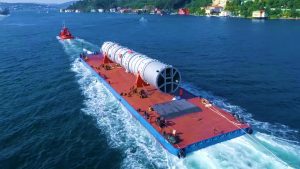
Case Studies: Successful Project Cargo Shipments in the Philippines
The project cargo industry in the Philippines has seen a significant boost in recent years, with successful shipments becoming more common. One notable case study is the transportation of heavy machinery for a major construction project in Manila. The project required the shipment of oversized equipment to Mindanao, including cranes and excavators, which posed challenges due to their size and weight. However, through meticulous planning and coordination, the project cargo in the Philippines was successfully transported from its point of origin to its destination within the specified timeframe.
Another successful case study involves the delivery of wind turbines for a renewable energy project in Northern Luzon. These wind turbines were imported from Europe and had to be transported by sea to their final location. The logistics involved in handling such large and delicate equipment required careful consideration. Specialized equipment and expertise were necessary to ensure the safe transportation of the wind turbines. The logistics team worked closely with shipping agents and crane operators to devise a detailed plan that accounted for every aspect of the journey.
First, meticulous planning was carried out to determine the most suitable vessels capable of accommodating these oversized cargo pieces. This involved analyzing factors such as vessel capacity, stability, and availability. Once identified, arrangements were made with reputable shipping companies that had experience in transporting similar heavy-lift cargo. The logistics team also collaborated with crane operators to assess the loading and unloading procedures. Specialized cranes were required to safely lift and position the wind turbines onto the vessels, considering their immense size and weight. The team ensured that these cranes were operated by highly skilled professionals who had previous experience in handling such delicate cargo.
In addition to vessel selection and crane operations, careful consideration was given to route planning. The logistics team thoroughly researched and planned the most efficient and secure routes for transporting the wind turbines. They took into account various factors such as road conditions, bridge heights, weight restrictions, and any potential obstacles along the way.
To ensure a smooth journey, they conducted detailed site surveys to identify any potential challenges that could arise during transportation. This allowed them to proactively address any issues beforehand and come up with contingency plans if needed.
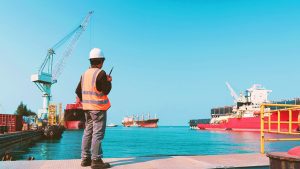
Future Trends in Project Cargo Handling
The project cargo handling industry in the Philippines is experiencing a wave of future trends that will revolutionize the way goods are transported and managed. With advancements in technology, increased globalization, and changing consumer demands, project cargo companies in the Philippines need to adapt to stay ahead of the competition.
One major trend that is shaping the future of project cargo in the Philippines is automation. As technology continues to advance, more companies are investing in automated systems to streamline their operations. This includes automated cranes and forklifts that can efficiently load and unload heavy cargo without human intervention. Additionally, advanced software programs are being developed to manage inventory, track shipments, and optimize logistics processes. These technological innovations not only increase efficiency but also reduce costs for project cargo handlers.
Another emerging trend in the field of project cargo in the Philippines is sustainability. As environmental concerns become more prominent, companies are seeking greener alternatives for transporting their goods.
Looking for a Reliable Project Cargo Company in the Philippines
If you are in need of a reliable project cargo service company in the Philippines, look no further than Full Speed Chartering and Shipping Agency, Inc. Known for providing cost-effective and timely logistics solutions, our company has established credibility and trust in the maritime shipping industry. With our extensive experience and expertise, they can handle even the most complex and challenging projects.
- Email us: info@fullspeedchartering.com
- Call our 24-hour hotline: +63 939 375 3224
- Viber: +63 939 375 3224
- WhatsApp: +63 939 375 3224
- Facebook Messenger: Click here
- Click here to inquire
Full Speed Chartering and Shipping Agency, Inc. understands that time is of the essence when it comes to project cargo in the Philippines. We prioritize efficiency and ensure that your goods are transported safely and on schedule. Our team of professionals is well-versed in handling all types of cargo, from oversized machinery to delicate equipment.
Not only does Full Speed Chartering and Shipping Agency, Inc. offer reliable shipping services, but we also provide cost-effective solutions to meet your budget requirements.
Takeaway: The Promising Future of Project Cargo in the Philippines
In conclusion, the industry of project cargo in the Philippines is poised for a promising future. The country’s strategic location, growing economy, and supportive government policies make it an ideal hub for project cargo activities. With increasing investments in infrastructure and energy projects, the demand for project cargo services is expected to rise significantly. However, to fully capitalize on this potential, stakeholders must work together to address challenges such as improving logistics capabilities and enhancing coordination among different sectors. By doing so, the Philippines can position itself as a leading player in the project cargo industry and reap the economic benefits that come with it. It is crucial for all stakeholders to collaborate and take proactive measures to realize this vision.
